June 24, 2025 / Leadership Story Lab
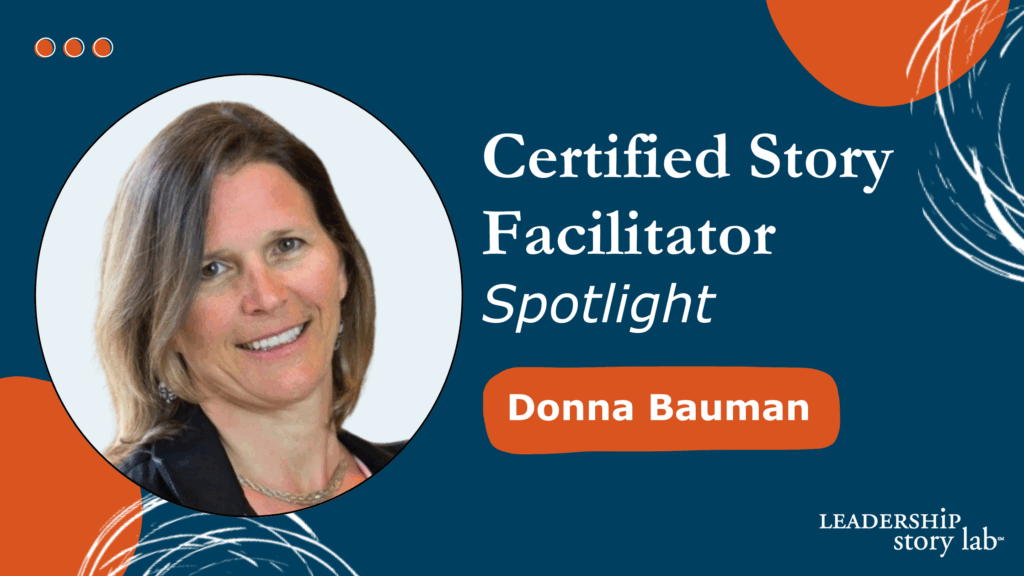 As a child learning to play chess with her father, Donna Bauman created stories about the chess pieces, rearranging them to create elaborate wedding processions. Her love for story facilitation stuck with her — and it’s helped her throughout her career. When she worked with a global advertising agency on campaigns for brands like Maxwell House Coffee and Corning Housewares, Donna used storytelling to help her find something about the products that resonated with consumers.
As a child learning to play chess with her father, Donna Bauman created stories about the chess pieces, rearranging them to create elaborate wedding processions. Her love for story facilitation stuck with her — and it’s helped her throughout her career. When she worked with a global advertising agency on campaigns for brands like Maxwell House Coffee and Corning Housewares, Donna used storytelling to help her find something about the products that resonated with consumers.
Today, Donna uses story facilitation as a coach for Stratus Admissions working with high-performing young professionals with the goal of being admitted to top MBA programs. She helps her clients find fascinating aspects of their own story and helps them learn how to share those stories through the application process and beyond.
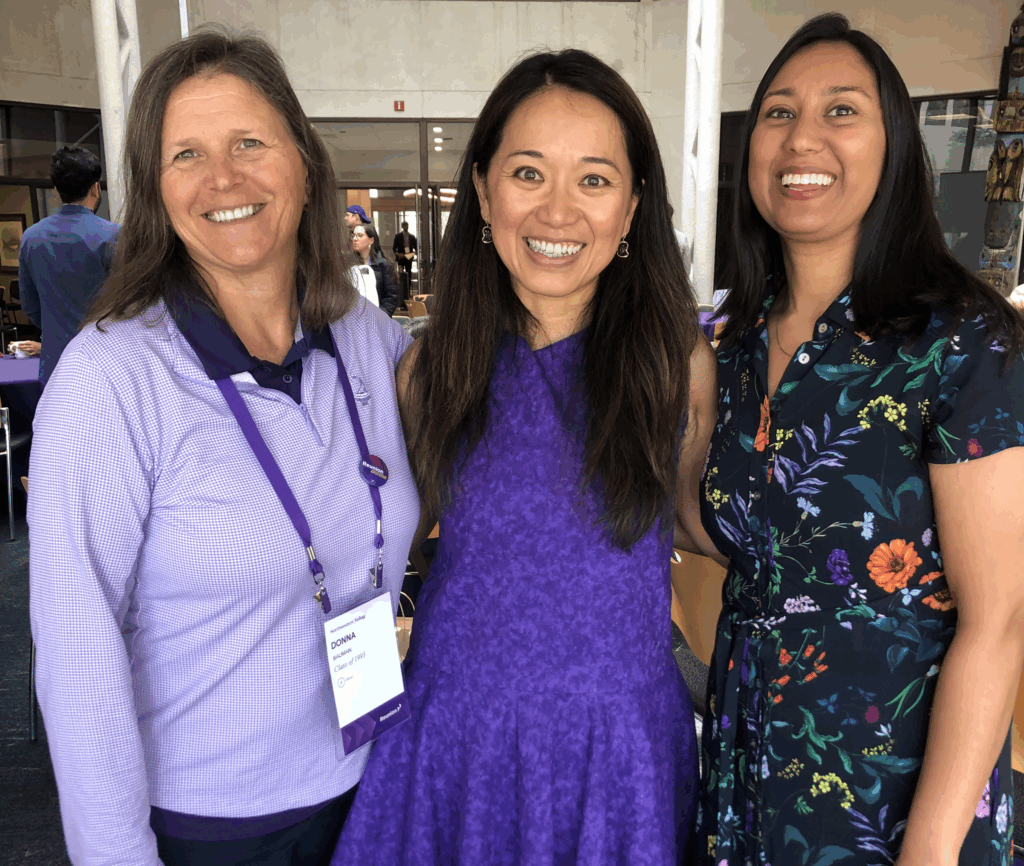
Story Facilitators unite at the Kellogg Reunion
Donna Bauman was in the inaugural class of the Leadership Story Lab’s Certified Facilitator Training which started during the height of the Pandemic in 2020. She has completed all three levels of the training — each level offers signature story facilitation tools and areas of mastery.
- Level 1: Master of Story Construction. Participants learn the anatomy of stories and how to structure story ideas into appropriate formats. Signature Exercise: Paired Introduction.
- Level 2: Master of Story Discovery. Participants master the art of idea exploration and cultivation. Signature Exercise: Passion DNA
- Level 3: Master of Story Synthesis. Participants learn to fuse disparate narratives into one coherent whole. Signature Exercise: Paradoxical Storytelling
We recently sat down with her to learn more about her work and how storytelling has supported her transformational work as a coach.
Leadership Story Lab: You’ve always been a proponent of story facilitation. How did you know that Certified Story Facilitation training was right for you and how has it impacted your work?
Donna Bauman: I met Esther at the Kellogg Reunion in 2018. I participated in the session about Esther’s book Let the Story Do the Work. She’s such an engaging presenter and it was such a great session I thought storytelling would be helpful in my coaching work. I realized I could intentionally learn what makes stories interesting and different techniques available to storytellers. So I bought her book. When COVID hit, it was a good time to retool and upskill so I signed up for the CSF training.
I’ve been able to infuse different exercises from the training into my work. I’m better at what I do because of it. I ask better questions.
The training has also helped me to listen more and talk less. You learn so much more by listening with purpose—and that’s also a facet of being a good facilitator and our training has helped me to understand this more.
And I enjoy my work more because I feel like I have a bigger quiver full of tools and ideas.
Donna, for example, uses the Crazy Good Questions from the Paired Introduction exercise in all her new client calls as key story facilitation tool.
I love those 20 questions we use in Paired Introductions. I love to ask them to tell me something that they’ve spent way too much money, time, or effort on, but they don’t regret. Because when you’re in a 20-minute conversation and trying to distill what someone really cares about, where they spend their time or their resources tells you a lot about what’s important to them and why.
Leadership Story Lab: Tell us more about the story facilitation skills you gained and your takeaways from completing the three levels of CSF.
Donna Bauman: I’ve found I’ve been able to help people make, draw connections and maybe understand their story in a way that they didn’t before. It’s very rewarding.
Another skill I learned at CSF and use everyday is just to be a better listener. That’s a really important skill that I never thought much about. Watching how expertly Esther and Reena engage people and get different people to talk in our sessions, I’ve learned so much. So that’s been another takeaway.
Also, I’ve learned there’s so many different things that you can do to make stories more interesting. Every day I use the IRS tool to evaluate a story.
IRS is a signature storytelling framework used in CSF to help shape brief, brilliant stories. The acronym stands for: I – intriguing beginning. R – riveting middle. S – satisfying end.
I immediately introduce the idea of IRS strategy to my clients. If I’m trying to get someone to go deeper into a certain part, I have tools to help them.
In Esther’s book she talks about how a good story has movement. If you have a story that just keeps going up and up —- I did this and I’m even better and I’ve won this and I’m the best in the world, you’re turning off most people.
Likewise, if everything just gets worse and worse and worse, you’re depressing people. So it’s really in that movement, in the tension. And that’s really the way life is, right?
Nothing valuable ever just happens. There’s a struggle, there’s that tension moment where you almost gave up. It’s getting people to focus in on some of those inflections, those moments where there was a lot going on and reflecting on the significance — That’s when you get some really interesting stories.
So those are just a few of the story facilitation skills that I’ve taken away from CSF and use all the time.
Leadership Story Lab: Can you give an example of helping your clients tell a story?
Donna Bauman: It’s so competitive to get into these top business schools. More people are not getting in than getting in. So a lot of people that I work with, they might be management consultants or bankers, or in private equity. I help them see how their particular story and the things that motivate them create something that is memorable. It’s the story only they can tell.
A bunch of people are consultants, but if one consultant is motivated to be working on climate issues because they’ve seen firsthand a climate disaster and they’re passionate because it’s personal — that’s going to drive their writing and their story in a certain direction.
Whereas another person might be a consultant, and they’re focused on healthcare because they had healthcare challenges and they saw how inefficient the system was or they saw how their parents were struggling to pay medical bills — that’s what drives them to work to make the healthcare system more efficient.
“Logic makes you think. Emotion makes you act.” At Leadership Story Lab, we often use this quote by Alan Weiss to help people understand the importance of leadership storytelling — the strategic sequencing of fact and emotion. It’s also at the heart of Donna Bauman’s coaching work. Most of the people applying to top MBA programs are excelling in their line work — a logical choice for admissions. So how do admissions officers choose who to admit? The applicants must grab the reader’s attention — and their heart.
These stories help admission officers learn about the applicants. When you can get someone to tap into their rocket fuel and share that, the application is so much more memorable.
I remember — this was many years ago — a woman who grew up where there was a lot of soil degradation and well before COVID she had to wear masks because of all the sand and dust that was just ripping across big swaths of land. She started cultivating medicinal herbs to try to hold the soil down. Planting cover crops to hold the soil.
That was such a powerful image to show why you care. What’s driving your interest in trying to create more sustainable, better practices?
If I can assist someone in uncover an image like that helps people understand their motivations, it’s memorable and differentiates them from the other applicants. It’s very powerful.
This CSF training has helped me to hone in on helping my clients uncover their stories.
Leadership Story Lab: How do you help them uncover their stories?
Donna Bauman: We have our clients tell us a lot of stories just to understand more about who they are. These stories may have nothing to do with what they’re going to write in their essays, but they help us see what’s important to them. We uncover themes that show up when they’re writing stories for their applications.
I try to help them move past the bullet points on their resume and answer the questions: What do you do? Why does this matter to you?
One of the tools Donna frequently uses is the concentric circles of Credentials-Competence-Character. This image helps her clients understand the need to go beyond demonstrating their credentials and competence, to share their character on their application. What selection committees and admissions officers really want to know about top candidates is what it’s going to be like to work with this individual. Sharing your character helps decisionmakers understand who you are.
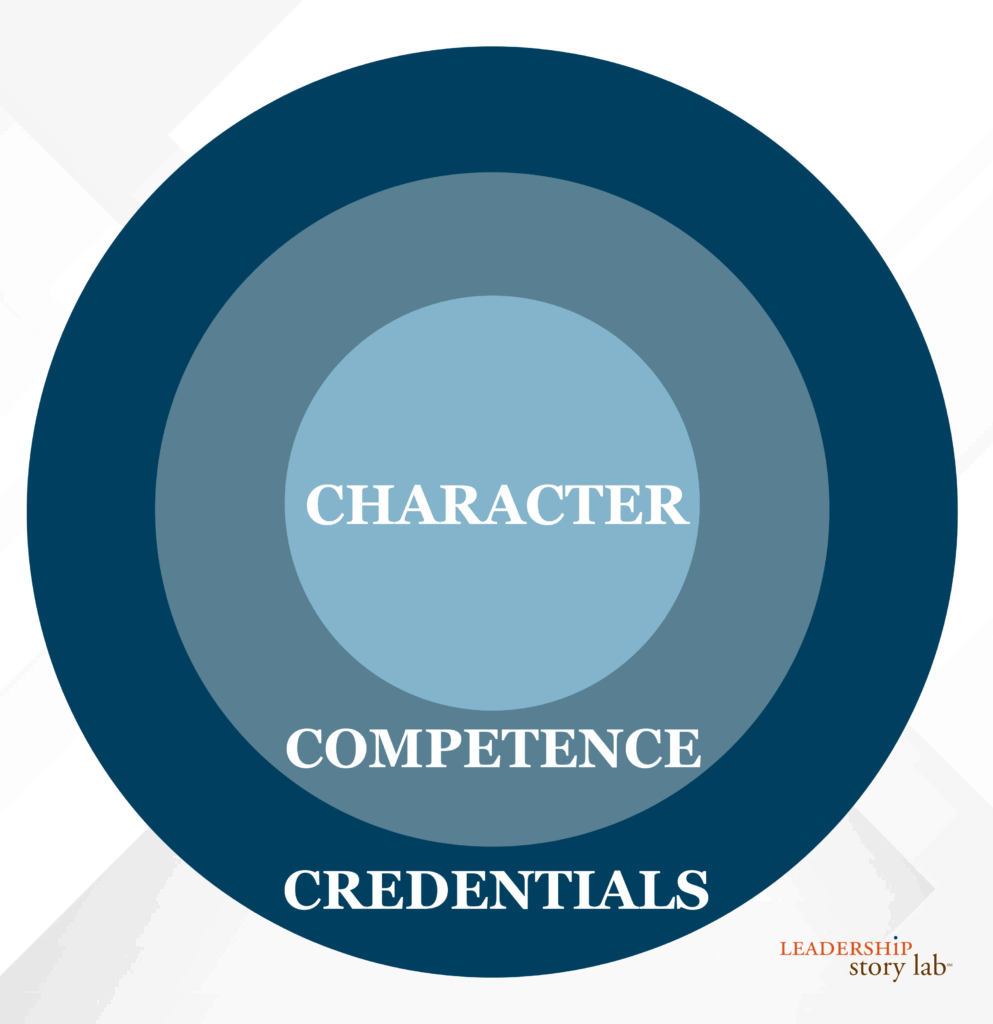
It’s a very sacred space to be with someone and help them think about the answers to these really big questions that we all should continue to ask ourselves. Why are we doing what we’re doing and why does that matter?
So these tools that Esther has developed and that we are learning how to use really make this process more valuable for people and just more fun to do with people.
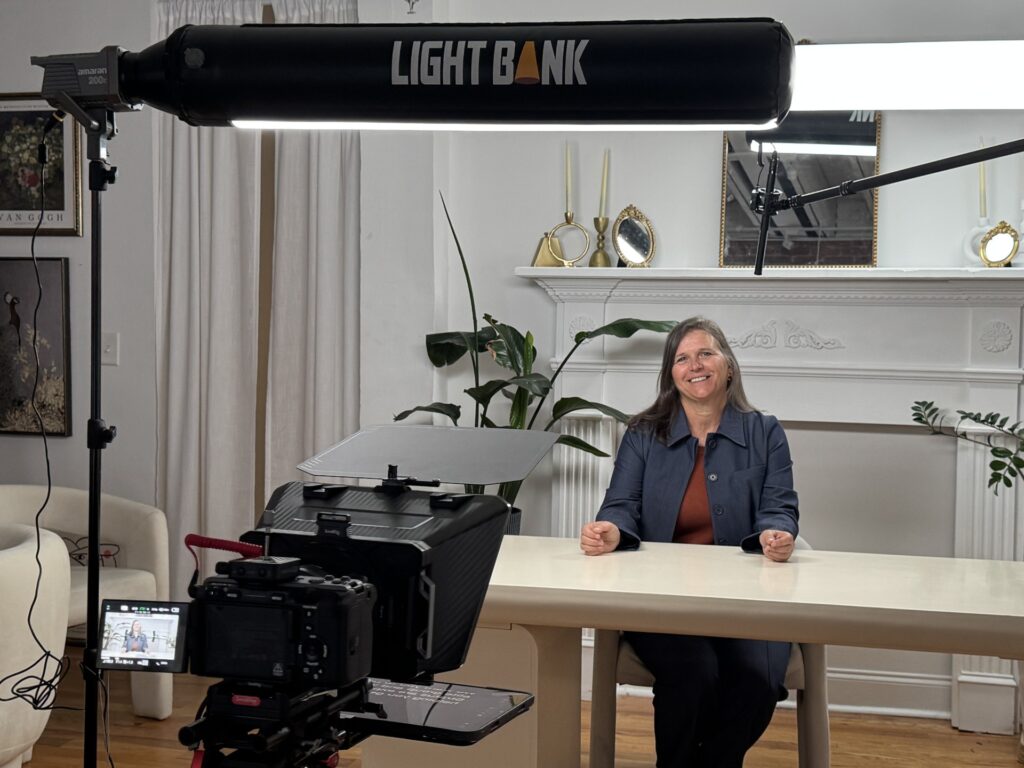
Donna and her company Stratus Admissions Counseling also leans on her leadership storytelling skills to create compelling content for their website to help potential clients understand why they should choose Stratus.
Leadership Story Lab: What has the CSF community meant to you for the past five years?
Donna: I always have our monthly storytelling calls on my calendar and I look forward to them! I see them as a creative infusion into my work, and it energizes me to hear new ideas and techniques to be a better storyteller. I also enjoy hearing how people in different professions use storytelling in their work and I am always picking up some new resources or ideas that I can use with my clients.
I view our monthly calls as a vitamin infusion for my own creativity! Our sessions energize me and give me new ideas and techniques to take into my sessions with clients. 100% I enjoy my job so much more since I added to my own creativity and storytelling knowledge bank!
I’ve never been part of such a supportive professional development community. I love having relationships with other professionals who are also passionate about storytelling, and I have a wide variety of colleagues across industries that I am comfortable reaching out to about things related to storytelling.
I’ve also enjoyed being challenged to keep growing professionally in being more comfortable presenting. We’re in the process in my admissions consulting firm of putting a lot of our written content into video form and I’ve been doing more on-camera work recently. I’ve been able to put into practice these storytelling techniques for my own communications objectives as well.
Leadership Story Lab: Thank you for taking the time to share more about your journey with us.
Donna: So this conversation has inspired me to keep adding to my toolkit and remember all the different tools and strategies we’ve covered over the years. CSF was really a nice thing to have during the dark years of COVID.
I don’t keep much on my desk. But one of the things I do keep is this glass paperweight.
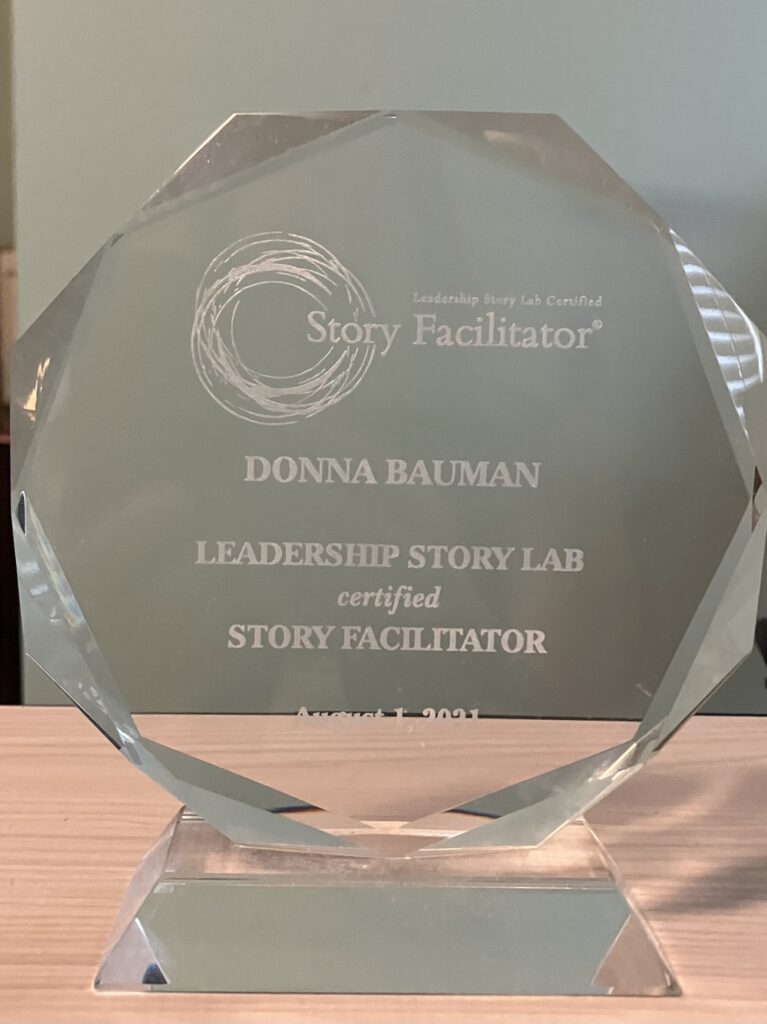
I like having it on my desk because it reminds me of that work. Each level was useful. I enjoyed doing all of it. It’s a credential on my LinkedIn. When someone is looking for an admissions coach and they see you’ve taken the time to formally get training in storytelling, it helps them make the choice. There are people who have written reviews about me and they’ve mentioned that they’ve appreciated that I have taken storytelling so seriously. Here’s one such review:
I interviewed 7 consultants and was ultimately drawn to Donna – she asked thoughtful questions, listened and was very transparent and honest… She helped me craft a cohesive story that highlighted my career aspirations in a way that also allowed my personality and voice to come through on paper.
Leadership Story Lab: Thank you, Donna, for taking the time to share your story with us today. It’s so inspiring to see how story facilitation helps open doors for so many people!
1 Comment
Leave a Comment
Better Every Story
Leadership Transformation through Storytelling
"This is an amazing and insightful post! I hadn’t thought of that so you broadened my perspective. I always appreciate your insight!" - Dan B.
Get Esther Choy’s insights, best practices and examples of great storytelling to your inbox each month.



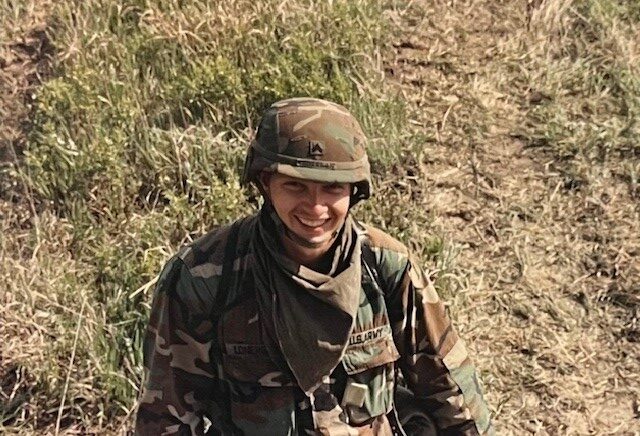
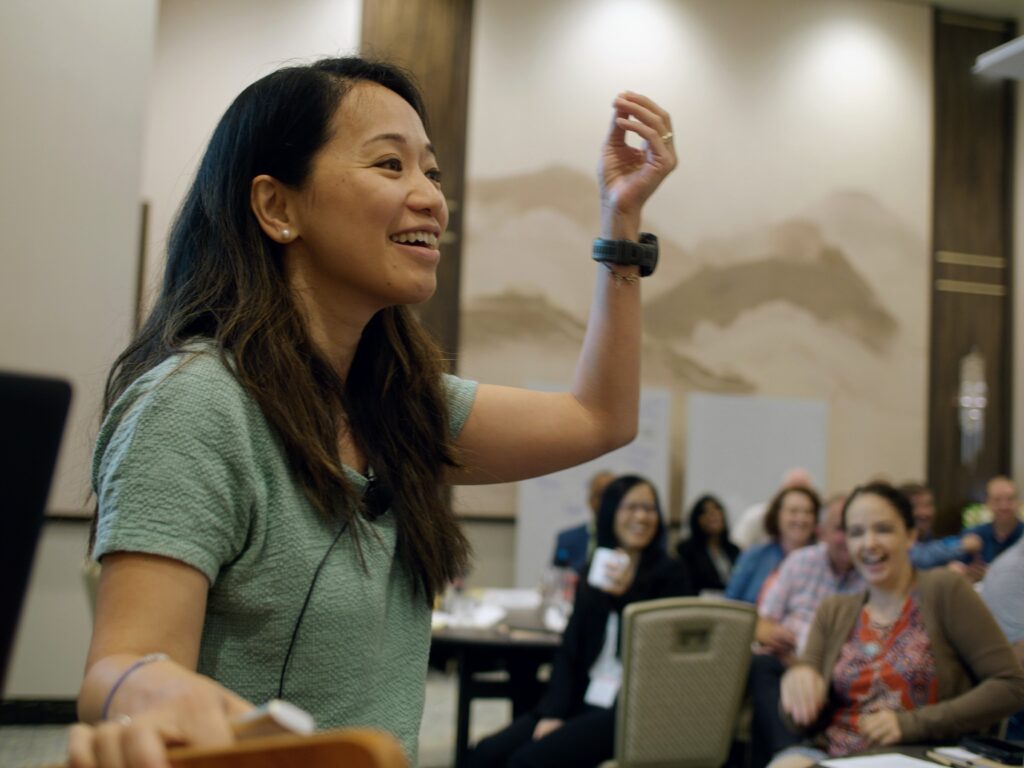
Donna Bauman: Congrats on using storytelling techniques to help your clients prep for their essays.
I use similar methodologies when I work as a recruiter with both my clients and candidates. I like to call myself the storytelling and relationship recruiter!
To really understand hiring managers and their companies, it’s important to understand culture, people and how their stories will become part of the company culture.
For candidates, I always ask, “What’s your story? Why should my client hire you?” We need the hook to engage interest. It’s the “human factor” at work.
The process becomes engaging. There is a flow of conversation back and forth.
Esther: Congrats for setting the bar high for what storytelling can accomplish: a method to engage, stimulate and motivate people to feel and remember. When we use stories to touch the heart and make them sticky in the brain, it’s MISSION ACCOMPLISHED!
If they answers with facts and figures